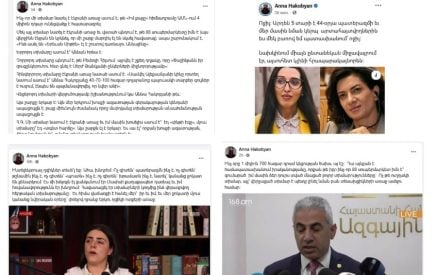As you know, the fight against corruption consists of three components: a/ prevention, establishment of a corresponding legislative base; b/ the rule of law, unreserved punishment of perpetrators; c/ public intolerance towards this phenomenon.
Some things have been done in the direction of the first item since the 2000s, but these “measures” bear a “campaign” nature, approximately like “a month of fighting against corruption.” Nothing has been done in the direction of the second and third items. Public perception is intolerant only at first glance, “Woe to them, they plundered and exhausted the country”, but when the author of these words is given the least opportunity to plunder something, he does the same with great pleasure: “he is raising a family.”
There is also no progress in terms of the responsibility. I remember when Robert Kocharyan came to power in 1998, there were rumors that now, the new government will punish and keep “all PANM robbers” behind the bar. But the PANM party members, many of whom were truly not sacred, were just kindergarten children in terms of plundering compared to those who come after them. After 1998, corruption obtained a systematic, institutional nature.
And in that sense, ideas arise about the responsibility in general, not only in corruption but also in all other matters. This, after all, is also a social issue. Living in Russian and afterward in the Soviet empire, we – the nowadays Armenians – genetically are used to the culture of “collective irresponsibility”. The Russian state still from pre-Peter times is traditionally based on “community thinking.” I can work good or bad in the community (kolkhoz), anyway, not personally I but the community is accountable, and my good or bad working is “concealed” in the result of this collective.
Read also
The “rudiments” of this thinking are available even today, “Oh, how good it was in the Soviet times, we were sitting relaxed in the Scientific Research Institute or design-engineering offices and were receiving our 120 rubles wages.” Or, “What a miracle it was” that we were producing “Yeraz” vehicles.” Never mind that this “Yeraz” was getting out of order until reaching Sevan. The engine and all the spare-parts were arriving from different parts of the Soviet country, here, we were only assembling them, but as we were stealing these parts, “Yeraz” was not going a long distance. And as to who exactly was stealing, it was difficult to tell, perhaps everybody to its extent.
Now, the time for a completely different thinking at the individual and state level has come. If I am a healthy and adult man, then I am responsible for my status, the outcome of my work, my living conditions, my personal happiness or misfortune. If I live in a state, then eventually I also bear responsibility for the operation or failure of its mechanisms. If I am dissatisfied with the “management” of the state, then I must change the “managers.” And if I cannot change, it is also my fault.
Aram ABRAHAMYAN






















































